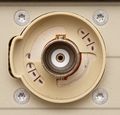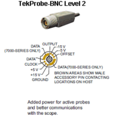Tekprobe BNC connector: Difference between revisions
No edit summary |
No edit summary |
||
| Line 67: | Line 67: | ||
==Pictures== | ==Pictures== | ||
<gallery> | <gallery> | ||
Tekprobe_connector.jpg|Tekprobe connector (socket) | Tekprobe_connector.jpg | Tekprobe BNC connector (socket) | ||
Tekprobe BNC plug.jpg | Tekprobe BNC plug (on [[P5210]]) | |||
Tekprobe BNC socket.jpg | Tekprobe BNC socket (on [[1103]]) | |||
Tekprobe_2_interface.png|Tekprobe-BNC interface | Tekprobe_2_interface.png|Tekprobe-BNC interface | ||
tcp202-3.jpg | Tekprobe plug | tcp202-3.jpg | Tekprobe plug | ||
Revision as of 13:01, 4 August 2019

The Tekprobe BNC interface was introduced in 1986 and is widely used in 1990s Tektronix equipment to interface active probes (e.g. the P6243) to oscilloscopes.
It consists of a plain BNC connector that allows traditional BNC based connections such as from passive probes.
This connector is surrounded by contact pads carrying power and data. The two larger pad areas match the simple resistive readout pins on probes from the 7000 series scope generation (e.g. a ×10 probe will connect this pad to ground through 11 kΩ, or short it to ground when the Identify button is pressed — see 7000 series readout system for details). The smaller pads carry +15 V, +5 V, −5 V and −15 V power, an offset voltage supplied and controlled by the mainframe, and a clock/data signal pair for serial communication between the mainframe and "smart" probes. Probes are allowed to draw max. 1.25 W, max. 75 mA from the ±5 V rails, and max. 25 mA from the ±15 V rails.
A similar standard exists based on SMA connectors, suitable for higher frequencies.

Used in
| Scopes | Plug-ins | Probes |
|---|---|---|
Links
- What is the TekProbe interface? (Tektronix FAQ)
- What is the difference between the Tekprobe and TekConnect probe interfaces? (Tektronix FAQ)




